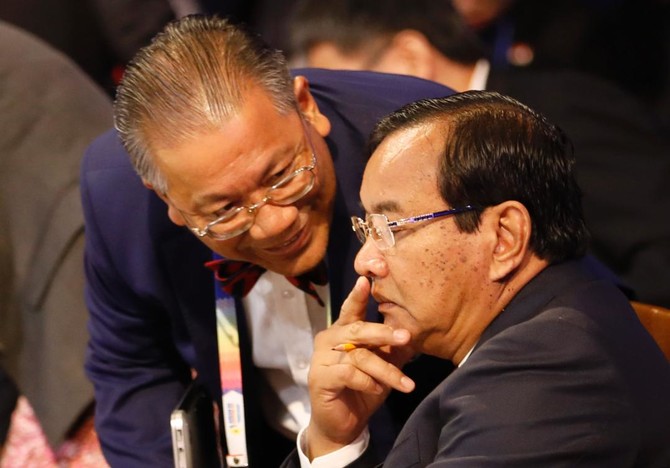MANILA: Two Southeast Asian diplomats say disagreements over North Korea’s intercontinental ballistic missile tests and territorial disputes in the South China Sea have prevented the region’s top diplomats from promptly issuing their joint communique after an annual summit in Manila over the weekend.
One of the diplomats tells The Associated Press that Cambodia expressed concern over the issuance by the Association of Southeast Asian Nations’ foreign ministers of a separate statement criticizing North Korea’s two ICBM tests last month.
The diplomat said Sunday Cambodia wants its sentiments on the Korean Peninsula better reflected in the ASEAN foreign ministers’ joint communique, causing a delay in its issuance Saturday after the ministers concluded their meeting.
Another diplomat says the wordings on the South China Sea issue to be included in the communique had not yet been finalized Saturday.
The diplomat says the South China Sea may be settled faster and will likely not carry sensitive issues that China objects to because the ministers are aware of Beijing’s crucial economic and trade relations with ASEAN member states.
Both diplomats spoke to the AP condition of anonymity because they were not authorized to discuss the issues publicly.
— Jim Gomez in Manila, Philippines
A Philippine government spokesman says Southeast Asian foreign ministers have endorsed the framework for a long-sought code of conduct in the disputed South China Sea.
The ministers endorsed the framework on Saturday, a day before meeting with their Chinese counterpart, when they are expected to jointly adopt it.
The Philippines calls the framework a major step in efforts to ease potential flashpoints. It’s not clear if the ministers will push for a legally binding code.
Critics say the outline of key principles is lopsidedly in China’s favor and suspect that Beijing may have consented to it to divert protests as it tries to complete and fortify man-made islands in the South China Sea with a missile defense system.
Robespierre L. Bolivar, spokesman of the Philippines’ Department of Foreign Affairs, said the foreign ministers “endorsed the framework of the code of conduct for eventual adoption at the ASEAN-China ministerial meeting on Aug. 6.”
Bolivar said the Philippines prefers a legally binding code of conduct but the consensus in ASEAN is that at the very least, the code that is still to be negotiated should be substantive and effective. He said the framework is an outline and countries can put in more substantive aspects of the code when the negotiations start.
Southeast Asia’s top diplomats have slammed North Korea with a sharp rebuke over its intercontinental ballistic missile tests and reminded Pyongyang of its duty to avoid conflicts as a member of Asia’s biggest security forum.
The 10 foreign ministers of the Association of Southeast Asian Nations reiterated in a joint statement Saturday their grave concerns over the escalation of tensions on the Korean Peninsula due to the North’s two ICBM tests last month, saying the launches threaten world stability.
Philippine Foreign Secretary Alan Peter Cayetano said earlier that the ASEAN ministers were divided over a US proposal to remove North Korea from the ASEAN Regional Forum, a 27-member grouping that includes the North, along with its most bitter adversaries — South Korea, the United States and Japan.
Southeast Asia’s top diplomats have opened their annual meeting at a convention and theater complex by Manila Bay without the usual security overkill. Motorists were allowed through as joggers, cyclists and tennis players sweated under a cloudy sky.
Public traffic was only stopped when the foreign ministers from the 10-member Association of Southeast Asian Nations, known as ASEAN, arrived midmorning Saturday.
According to metropolitan Manila police chief Oscar Albayalde, Philippine President Rodrigo Duterte has shown disdain for security lockdowns that inconvenience the public. Still, police deployed more than 13,000 officers in the capital and declared no-fly and no-sail zones around the venue.
Topping the agenda are North Korea’s intercontinental ballistic missile tests, an attempt to temper South China Sea disputes and unease over a siege by pro-Daesh group militants in the southern Philippine city of Marawi, which has dragged on for more than two months.
Disagreements in ASEAN delay joint statement
Disagreements in ASEAN delay joint statement











